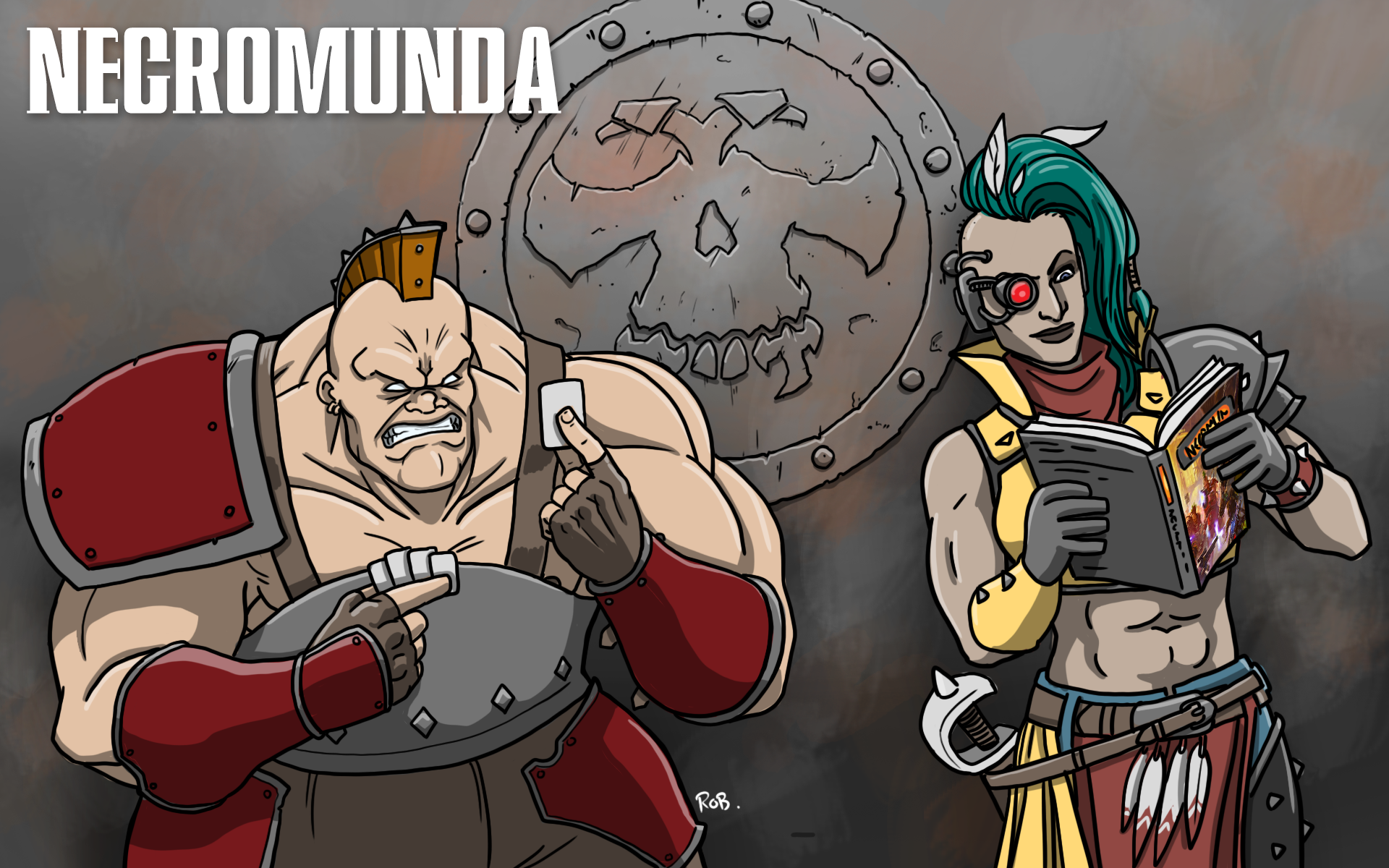Welcome back, scummers! Here at the Goonhammer offices we’ve received a number of requests recently to talk more about campaigns and now that we’re done with our gang guide-related obligations, we can finally talk about everything you need to know about running a campaign in Necromunda.
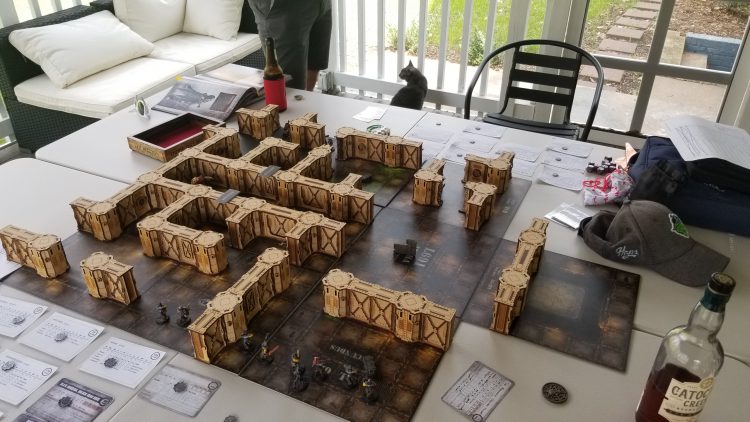
Campaigns are essentially the way Necromunda was meant to be played, with gangs changing and evolving over time as gangers advance, re-arm, die, and are replaced in a desperate fight for control of the underhive. The game’s rules are written with longer campaigns in mind, and the increased stakes and added narrative dressing really elevate the game in a way that one-off games cannot match.
We cannot stress how much fun playing in a Necromunda campaign can be. The game blends tabletop strategy and the characterful flavor of old-school pen and paper RPGs in a unique and engaging way. Watching your fighters progress (or meet an ignominious end!) during the campaign is absolutely the best part of the whole thing, and you really can’t get that out of skirmish games.
Recruiting Players
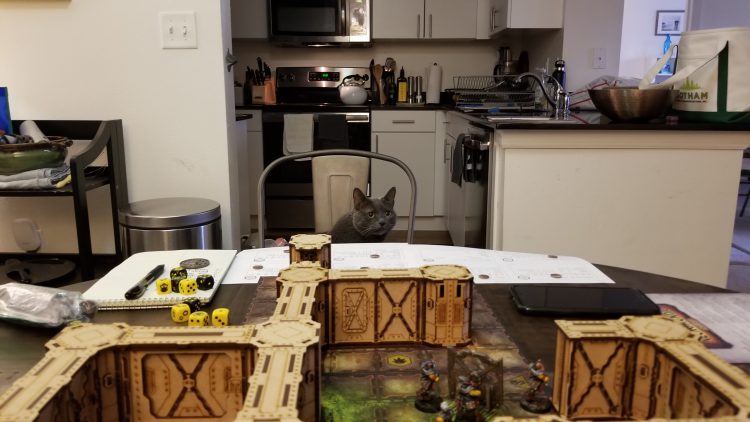
The first part of any campaign is finding players to play in it. If you’ve got a group of friends itching to blast each other (figuratively) off of some gantries, then you’re set! Read on, already! If not, you might have to be the change you want to see in the world and drum up interest on your own.
How Many Players Do I Need?
You can play a Necromunda campaign with as few as two players. It might get a little repetitive after a while, but it is a 100% viable option. We suggest getting together a group between four and ten players strong. Four is a great starting point, because it’s only 3 other people to manage, and each player can get games against different opponents every round. Ten is really the functional upper limit of a campaign as that is a whole lotta people to manage, and a whole lotta gangs to keep straight. If you’re working on your first campaign, we definitely suggest keeping it on the smaller side.
What if I Don’t Have Any Friends That Play?
If you don’t already have a large group of friends with their own gangs ready to campaign, there are a few ways to help expand your player base.
- The Gift Route – If you’ve got disposable income, one great way to get your friends into the game is just to buy them a gang. The box sets, such as the Underhive and Dark Uprising starter boxes, are perfect for this, since each one comes with two gangs (Goliaths and Eschers in the Underhive box, Corpse Grinders and Palanite Enforcers in Dark Uprising). Buy the box, give the other gang to a friend and boom!–they’re immediately invested in the game, may as well play a game or two. Sure, this means spending some money, but it’s cheaper than buying them an army for 40k or Age of Sigmar.
- Loaner Gangs – If you’ve got an extra gang, offer to lend one to a friend for a few intro games or even a whole campaign. Just be sure you’re OK with someone handling your models before you take this road.
- The 40k Backdoor – If your friends play 40k or Kill Team, there are a couple of avenues that Necromunda presents for making the jump to the Underhive without having to buy new models. Genestealer Cults and Chaos Cultists both have representative gangs in Necromunda, and in a pinch and with a little imagination you can repurpose Tempestus Scions as Palanite Enforcers.
- Run Some Demo Games – Get a couple of gangs, get some friends together, get some booze, and run people through a few demo games. Maybe even do a small campaign over the course of a night or weekend. Once your friends play the game and fall in love with it, they’ll be interested in building gangs of their own. Or they won’t like Necromunda and you’ll know that your friendship was a sham all along.
- Local Store Recruiting – Obviously not ideal at this particular moment (late March 2020), but if you are looking for more players and willing to expand your friend group, you can recruit from your local store’s player base. Ask your store owner about helping advertise your campaign, putting up flyers, and if your store has a Facebook group or Discord, put the word out there (again, with the owner’s permission). We recommend having your first few games with people you don’t know in a public location like a store before you invite them into your home. Also, be aware that you might have more work as an arbitrator if you’re playing with people you don’t know well, but you also may find that the players you meet this way become good friends in time.
Ok But Like What if I Just Don’t Have Any Friends?
That is very sad. We’ll likely write a future article on “how to make ham friends” but for now “how to make friends” is beyond the scope of this article. And come on, you’ve always got friends at Goonhammer!
Choosing a Campaign
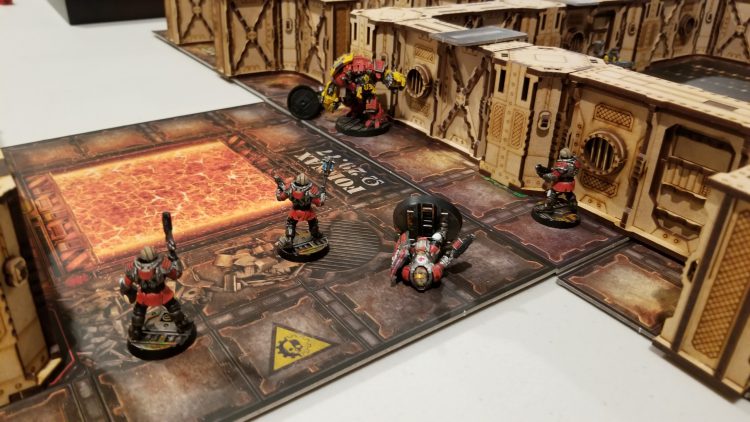
The next step in the process is picking the type of campaign you want to run. The good news here is that Necromunda has several great options already at your disposal.
Turf War
The original Necromunda campaign rules, introduced in the Gang War I book. This campaign has rules for capturing territory and gang progression, but has been replaced by the Dominion campaign (below), which is now in the 2018 rulebook as the “default” Necromunda campaign. Given that the Turf War rules never really got properly fleshed out, didn’t really work, and don’t accommodate non-house gangs, it’s our recommendation that you should avoid even giving them a try.
Dominion
Introduced in Gang War IV, the Dominion Campaign and folded into the second edition of the Necromunda rulebook, the Dominion campaign is based around gangs fighting for control of territory in the underhive, with every battle fought over the control of a specific territory at stake. Holding a specific territory grants the gang controlling it a benefit called a boon and the campaign lasts a specific amount of time, after which the winner is determined based on which gang controls the most territories, has the most rep, resources, and how many enemies they’ve taken down.
For a more tactical view of the Dominion Campaign’s assets, we’ve compiled a ranking of all of the Dominion Campaign territories here.
Law and Misrule
Introduced in the Book of Judgment, the Law and Misrule campaign acts as an evolution of the Dominion campaign, introducing some streamlined mechanics and a number of new wrinkles for gangs to deal with, such as gang alignments and Intrigues. Alignments allow a gang to choose whether it’s generally law-abiding or outlaws, with bonuses and penalties for each, and Intrigues, which affect every game and direct a gang’s alignment in cool and interesting ways. The Law and Misrule campaign makes things a bit more complicated, but adds a lot of cool wrinkles, making it a great way to spice things up for a play group who have already run a campaign or two.
For more on the Law and Misrule campaign, check out our review of the rules and changes in the campaign.
Uprising
The most recent addition to the campaign rules, the Uprising campaign was introduced in the Dark Uprising expansion and takes a more focused look at a specific type of narrative, where gangs become corrupted and fall to the machinations of Chaos.
The Uprising campaign adds a lot of fun and new mechanics to the game, but it removes an Arbitrator’s single biggest headache: The Trading Post. Despite all the Chaos wackiness present in an Uprising campaign, the lack of a Trading Post might actually make it the simplest and easiest-to-parse campaign. It might seem counter-intuitive, but the Uprising campaign is probably the best campaign for beginners!
For more on the Uprising campaign, check out our review of the campaign’s rules.
Making a Schedule
Once you’ve chosen your campaign, the next step is building a schedule. In order for a campaign to run smoothly, you’ll need to make sure that players are playing roughly the same number of games. This helps ensure that gangs are on the same general level, and that more time-advantaged players don’t end up running away with the campaign as they get in two to three times more games than players who can only play occasionally.
Having clear start and end dates for campaign rounds is a must. The various sourcebooks suggest a six-round campaign, but after running some campaigns, six rounds might be too much! Consider dropping it to a four-round affair for ease of arbitration. One of the most difficult things to do is keep interest levels high throughout a campaign, and having a shorter campaign easily mitigates that.
While life in the Underhive sucks, real life can also suck, and your job as arbitrator is to make it so that players can reasonably participate in every round of the campaign. For that, we suggest that you space out your rounds to accommodate the vagaries of real life. One game of Necromunda every two weeks is a very easy bar to clear for most people and won’t cause your players to experience fatigue and bow out of the campaign.
Here are a couple of example schedules:
6-Round Campaign
- Round 1 – weeks 1 and 2
- Round 2 – weeks 3 and 4
- Round 3 – weeks 5 and 6
- Downtime – weeks 7 and 8 (downtime is always a great time for a special event or two!)
- Round 4 – weeks 9 and 10
- Round 5 – weeks 11 and 12
- Round 6 – weeks 13 and 14
14 weeks might seem like a long time to have a campaign going, but the games are spread-out enough that your players hopefully won’t get tired of all the action (and bookkeeping!).
4-Round Campaign
- Round 1 – weeks 1 and 2
- Round 2 – weeks 3 and 4
- Downtime – weeks 5 and 6
- Round 3 – weeks 7 and 8
- Round 4 – weeks 9 and 10
Think about giving the 4-round campaign a shot. At the end of 6 rounds a lot of gangs will be bloated and unwieldy. Games tend to take a lot longer when each gang has every trick in the book at their disposal. Late games in the 4-round campaign won’t take as long, will be more balanced, and leave your players wanting more! If you’re a burgeoning Arbitrator, we suggest giving the 4-round campaign a shot as your first campaign.
Additionally, you may want to better regulate the way people pick their opponents during your campaign. In Dan’s latest campaign, he set it up so the players with the lowest gang ratings get to choose their opponents first each round so they weren’t stuck playing the top-ranked gang if they didn’t want to.
Special Events
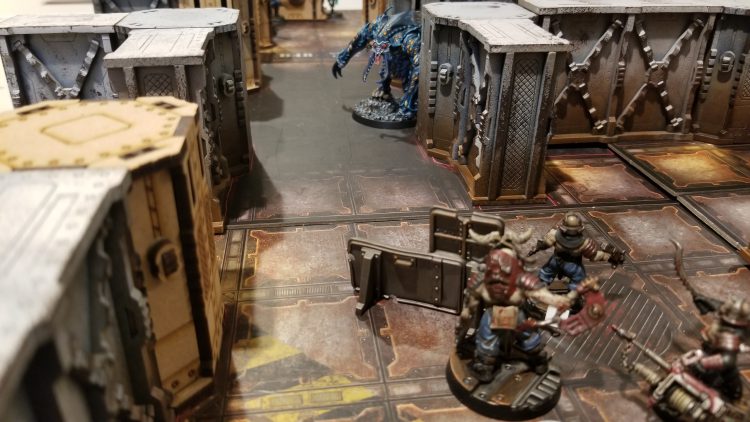
If you have time and the inclination to get creative, you can also organize special events in your campaign. These can take a variety of forms, but will typically be special one-off missions that involve multiple players at the same time, such as an Ambull hunt that sees several gangs stalking underhive tunnels to capture one of the dangerous beasts, or an arena battle where several gangs are invited to participate in a gladiatorial display of combat prowess. Or consider the ever-popular Juve Pit Fight, pitting Juves or their analogs from every gang in a desperate fight to the death for renown and rewards!
The middle part of any campaign is a great spot for a special event. It’s called Downtime, and it gives gangs a chance to rest, rearm, and recruit. Think about setting up an optional but fun multi-player game for your players during downtime to keep them into the campaign and as an excuse to invite everyone over and have a few beers, maybe!
House Rules
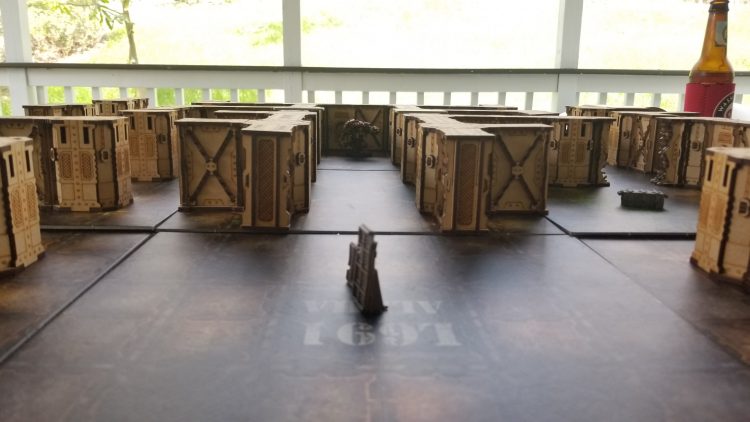
Campaign play in Necromunda can get unbalanced quickly, so you might want to think about adding your own rules in to keep things fun and fresh. Fortunately, we’ve written an entire article about just that!
Starting the Campaign
All right! Enthusiasm is high, players are ready, and gangs are (hopefully) painted. You’ve got all the tools you need to get this thing off the ground. Think about how you’re going to get messages to your players during the campaign. We recommend setting up a small Discord server and to invite your players. It’s free, and it’s a cool way to keep everyone interacting with each other throughout the whole campaign.
Being a Good Arbitrator
We could easily do an entire article on being a good Arbitrator (and we probably will in a future Narrative Forge article), but it really all boils down to one important idea:
The Arbitrator’s job is to make the campaign fun for everyone.
When a player is winning games, gaining XP, and stashin’ cash, it’s easy for them to have fun. The harder job is making sure your campaign is still fun for the player who’s maybe lost a couple of games. Coming up with ways to even the playing field is going to be important. One very important point, though: It is always better to uplift rather than restrict. If you’re out there stopping a successful player from playing with the toys they’ve earned over the campaign in the name of balance, they might feel somewhat put-upon and lose excitement for the campaign. Instead, give the underdog tools to make up some of the distance between the two players. Maybe they receive a cache of powerful weapons from a mysterious benefactor, or perhaps an itinerant bounty hunter sees the chance to profit off of their opponents and signs up for free for a game. Whatever you decide, just keep in mind: Uplift rather than restrict.
Mid-Campaign Arbitration
One of the hardest parts of running a campaign is keeping up interest and momentum. During the campaign you’ll have to do that as Arbitrator. The easiest way to do this is through constant communication: Use your method of communication to get players talking to one another, give out bulletins of important developments, and report on each battle you fight while encouraging your players to do the same.
As gangs increase in size and strength, keep overall gang balance in mind. Figure out ways to uplift your weaker players’ gangs with gifts of weapons, items, experience, or give them an advantage for a certain type of mission. Players who fall behind will, naturally, begin to lose interest, so keep them at the forefront of your mind when it comes to campaign balance.
It’s also a good idea to plan a big, silly, multi-player event to end the campaign. Events like this will give players something to look forward to as the campaign progresses. For instance, in Dan’s current campaign, there’s one Corpse Grinder gang that is currently running away with it. He’s thinking about setting up some sort of Purge scenario that pits small crews from every other gang up against the Corpse Grinders to end the campaign. And maybe if the Grinders win against the odds, then the next campaign will be an Uprising, as chaos and madness descend over the hive…
Ending the Campaign
Ok, your rounds are over, everyone’s got all their games in, so now what? Take some time to create some sort of campaign wrap-up. Recognize the gangs’ greatest heroes, most dastardly villains, and maybe even take time to memorialize the dear departed. Definitely give recognition to your players: best gang, richest gang, most perma-kills, and so on. If you’re into it, go get some certificates printed and throw a campaign-ending happy hour! Your players are guaranteed to come back for another campaign after that!
Setting Up the Next Campaign
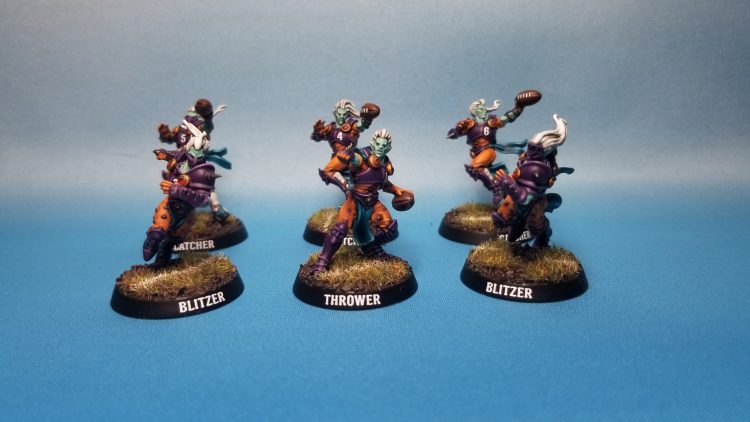
Once your campaign has ended, it’s time for the next one! Sit down with your players and talk about what they liked about the previous one, what they didn’t like, and what they would like to see next time around. Think about the highlights and lowlights, and what you could have done better. Necromunda is a game with plenty of holes, so think about what has worked and what hasn’t.
As an example, Dan’s thinking that Intrigues are a bit of an issue in Law & Misrule campaigns. They’re very poorly balanced, and can let gangs get extremely powerful extremely quickly. There’s probably a way to compress their effectiveness somehow, and that’s something he’s going to look into before he runs another Law & Misrule campaign.
Putting it All Together
There you have it, scummers. Everything you need to start running your own campaign and building a hive-wide empire from the ground up. As always, if you have any questions or feedback, feel free to drop us a note in the comments below or email us at necromunday@goonhammer.com.
If you’ve got a moment, send some positive energy Merton’s way, as he’s dealing with illness. We’re sure he’ll be back soon, though, to grace us with his knowledge and creativity regarding our favorite skirmish game. Until then, stay safe and healthy, scummers!
